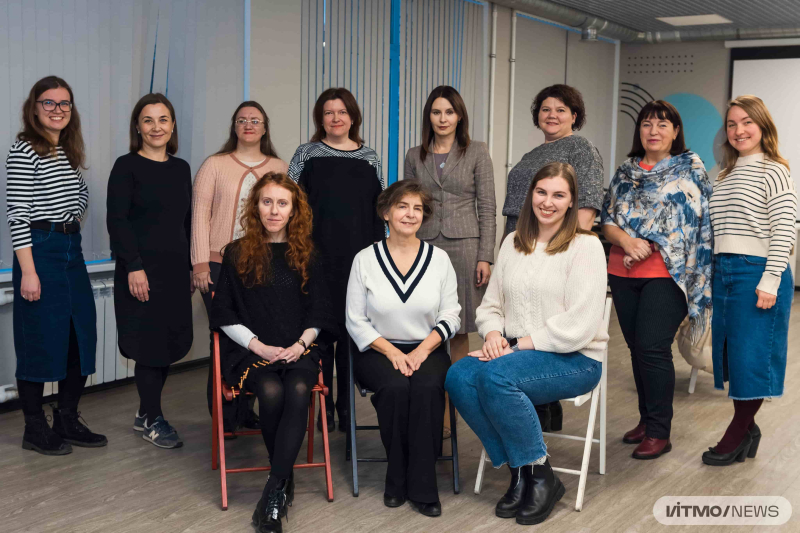- Natalia Kondrashova, Associate Professor, Foreign Language Training Center
- Svetlana Dorofeeva, Foreign Language Training Center
- Oksana Kolegova, Foreign Language Training Center
- Natalia Kokoshnikova, Foreign Language Training Center
- Maria Semina, Foreign Language Training Center
- Tatiana Sizova, Foreign Language Training Center
Natalia Kondrashova, Associate Professor, Foreign Language Training Center
Natalia Kondrashova . Credit: Dmitry Grigoryev for ITMO.NEWS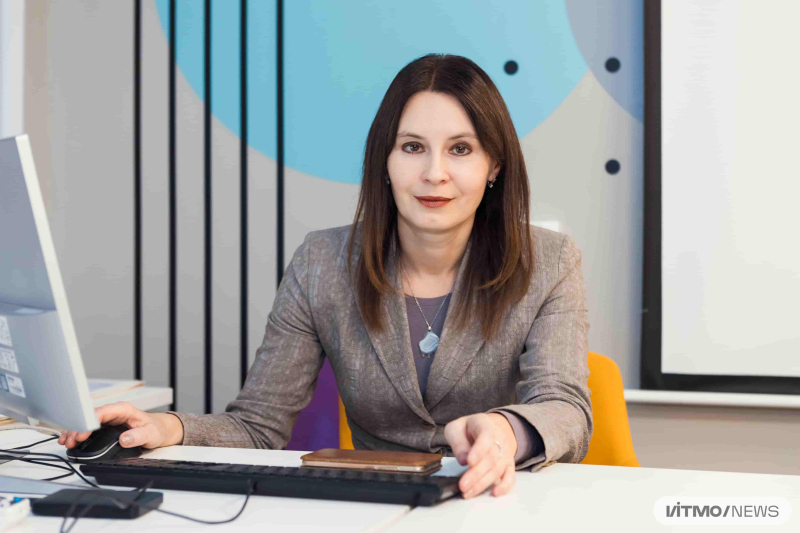
What word do your students love the most?
I’ve noticed that many students love the word чуть-чуть [Note: pronounced choot-choot and means “just a little”]. When they hear it, they start to smile. They find it funny. If I am teaching in another country or if students come to Russia with just a little knowledge of Russian, often they already know this word and understand it well.
In what ways have your students impressed you?
I’m really impressed and have a lot of respect for when a very young person copes with all the difficulties of "survival" in a foreign country and studies in a foreign language together with Russian students, confidently working towards their goals and achieving them.
What is a “good student” for you?
For me, a good student is not necessarily strong in his or her knowledge or even a very capable student, but rather one that is inquisitive, motivated, active, and at the same time responsible. Such a student is interesting to teach, and the result can be excellent.
How do you teach students to pronounce the sound Ы?
You need to pronounce the Russian letter У [pronounced: oo] and at the same time stretch out your lips to the side as if you’re pronouncing the Russian letter И [pronounced: ii].
What Russian language learning tips do you have?
Firstly, Russian should not be compared with other languages, you shouldn’t study Russian through the lens of another language, for example, English, as is often the case. Secondly, do not stop at mastering specific words or grammatical constructions, but immediately apply what you have learned in practice, communicate more with native speakers.
What do students struggle with the most when learning Russian?
It often depends on a student’s language background. For students from Southeast Asia, it is understanding Russian speech and pronunciation. For students from Central Asia and the Middle East, it’s grammar and often retelling large amounts of text. For European students who are native speakers of Slavic languages, it’s the “false friends,” those words that are very similar to a word in their native language, but in Russian they have different meanings or are used differently. .
Svetlana Dorofeeva, Foreign Language Training Center
Svetlana Dorofeeva. Credit: Dmitry Grigoryev for ITMO.NEWS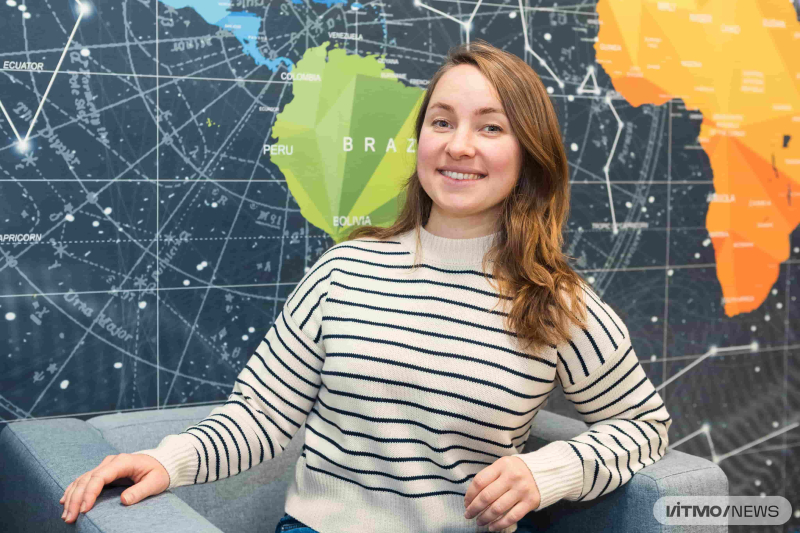
What is your favorite spot in St. Petersburg?
I love the courtyard of the Anna Akhmatova Museum at the Fountain House, especially in the summer, when passersby can play the piano located there.
What's a movie everyone should watch?
Across the Universe by Julie Taymor.
What’s your favorite Russian word?
Потихонечку – I find the meaning and melody of this word very calming. [Note: pronounced “potikhonechku” – this is a diminutive word for saying “slowly”, “quietly”, “gradually” or “little by little”].
What are the top hard-to-translate words in Russian and how do you go about explaining them?
The verb зимовать [Note: pronounced “zimovat” – it comes from the word for winter (зима) and quite literally means “to winter”]. Students often ask why there isn’t a similar verb for spring or summer. So, I tell them all about the endless Russian winters across vast expanses.
What do students struggle with the most when learning Russian?
The perfect and imperfect form of verbs, and putting the right stress on syllables. It’s also difficult for students to distinguish between Russian patronymics and surnames.
What is your dream travel destination and why?
I really would love to visit some African countries, my students have inspired me.
In what ways have your students surprised you?
Students from warmer climates don’t freeze when you open the window in the winter. I freeze, but they don’t.
Oksana Kolegova, Foreign Language Training Center
Oksana Kolegova. Credit: Dmitry Grigoryev for ITMO.NEWS
What new things about the Russian language have you discovered through teaching it?
The limitlessness of Russian word formation. I had never really thought about it before, just how often we use diminutive suffixes. On the first day of winter, I explained the word зимушка [Note: pronounced “zimushka”, this is a diminutive form of the word “зима” pronounced “zima” meaning “winter”] to my students, they laughed for a very long time at the fact that the diminutive suffix is used for the name of a season, especially for the name of the coldest time of the year.
What’s a book everyone should read?
Doctor Zhivago by Boris Pasternak and The Name of the Rose by Umberto Eco. I can't say that either are an easy read, but both of these books are like a time machine: one takes you to the first half of the 20th century, and the other – to the 14th century.
What's a movie everyone should watch? One of my favorite films is The King’s Speech. The film is about a British King, George VI, who is trying to overcome stuttering. I think this film reminds me a bit of my own work and my students, I also need to help them speak confidently.
What is a word students really love?
Достопримечательность [Note: pronounced “dostoprimechatelnost” and means “landmark” or “sight”] creates a lot of frenzy. Despite the fact that the word is long, it is usually easy to remember. Students will gladly incorporate this word into their responses on their first A1 level exam. They are very proud that they are able to remember and pronounce it. It turns out that the complexity of the word doesn’t scare them, but actually interests them.
What Russian language learning tips do you have?
Immerse yourself in the atmosphere of the language – watch movies and videos, subscribe to Russian-speaking bloggers, listen to Russian music, talk with Russian students, change the language on your phone from your native language to Russian, try to keep a diary in Russian.
What do students struggle with the most when learning Russian?
Verbs of motion, plurals in the genitive case, and declension of numerals – these areas require a great deal of practice and considerable effort on the part of both the student and the teacher. And of course putting the correct stress on syllables.
Natalia Kokoshnikova, Foreign Language Training Center
Natalia Kokoshnikova. Credit: Dmitry Grigoryev for ITMO.NEWS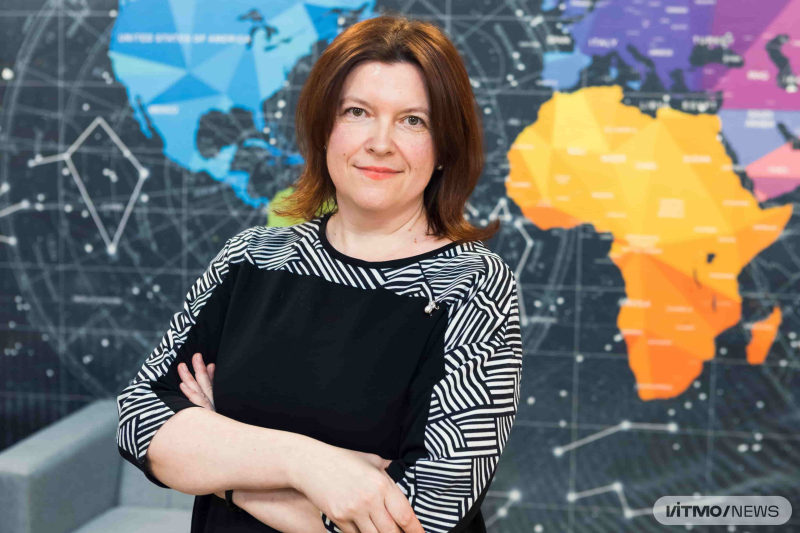
What is your favorite spot in St. Petersburg?
I really like the Marble Hall in the Ethnographic Museum. I also love Moskovsky Prospekt, with its grand and monumental architecture and simple forms.
What is a book everyone should read?
Now leading up to the holidays I’d recommend reading or rereading The Gift of the Magi by O. Henry, A Christmas Carol by Charles Dickens, and Evenings on a Farm Near Dikanka by Nikolai Gogol.
What is your dream travel destination and why?
Australia. For us, this country seems like a different planet, a different world.
What tips would you give to future students to help them prepare for coming to Russia?
Read in advance about the country, about its people, and about its achievements. Don’t believe all the stereotypes, come here and make up your own mind about Russia.
What Russian language learning tips do you have?
Any foreign language should not be studied only through textbooks. You have to talk to native speakers, read books, watch films, listen to songs. Only that way can you truly master a language.
In what ways have your students surprised or impressed you?
My students often surprise me. For example, one student shared in a class that he had learned the word прокрастинация [procrastination]. He liked this word so much that he gave a presentation about. It’s not only language successes that impress me, but also students’ professional achievements. One of our students travelled to Moscow recently for a competition related to IT technologies, and he won in three out of the four categories in the competition. At the award ceremony, the host who interviewed him praised him for his high level of proficiency in Russian.
Maria Semina, Foreign Language Training Center
Maria Semina. Credit: Dmitry Grigoryev for ITMO.NEWS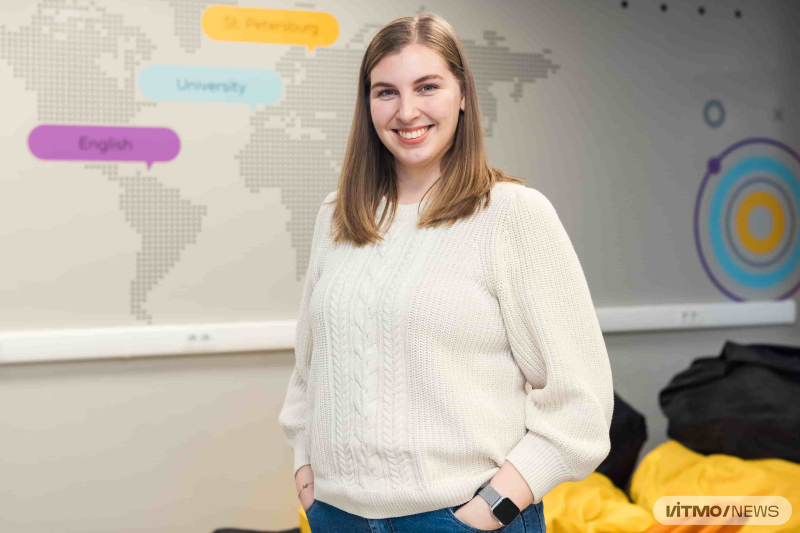
What is your favorite spot in Russia?
There are too many! I was in Kaliningrad Oblast this fall, and I would say that the Baltic seaside is terrific, and the Curonian Spit, too, impressed me. And of course the Russian North! I’ve been to Karelia many times, in Murmansk region, on Barentsev seaside that's insane. I would love to travel there in winter to see the Northern lights.
Which book would you recommend reading?
Eugene Onegin by Alexandr Pushkin, I’m a romantic, yeah. And all of Franz Kafka’s novels, I’m a Kafka maniac.
What's a movie everyone should watch?
The Fountain by Darren Aronofsky, just watch it. I love this director, he has wonderful movies.
What are the top hard-to-translate words in Russian and how do you go about explaining them?
Электричка [electrichka] or маршрутка [marshrutka]. It just takes a lot of time to explain the difference between электричка and a train, маршрутка and a bus. How do I go about explaining them? I’m trying to convey the philosophy of these means of transport. [Note: An electrichka is a specific type of suburban train used between smaller cities in Russia, and a marshrutka is a type of minibus or van used across Russia to get to areas not serviced by buses]
How do you teach students to pronounce the sound Ы?
Make a loud deep noise somewhere from inside while smiling or imagine that somebody is punching you in the stomach.
What Russian language learning tips do you have?
Listen as much as you can, it’s better to listen to native speakers: movies, shows, anything. Russians love hearing someone speak their language, even if you make mistakes! For us, it’s a (kind of) joy, for you, it’s practice.
What do students struggle with the most when learning Russian?
My top 3 are pronunciation, cases & verbs of motion… these are merciless and, of course, exceptions!
Tatiana Sizova, Foreign Language Training Center
Tatiana Sizova. Credit: Dmitry Grigoryev for ITMO.NEWS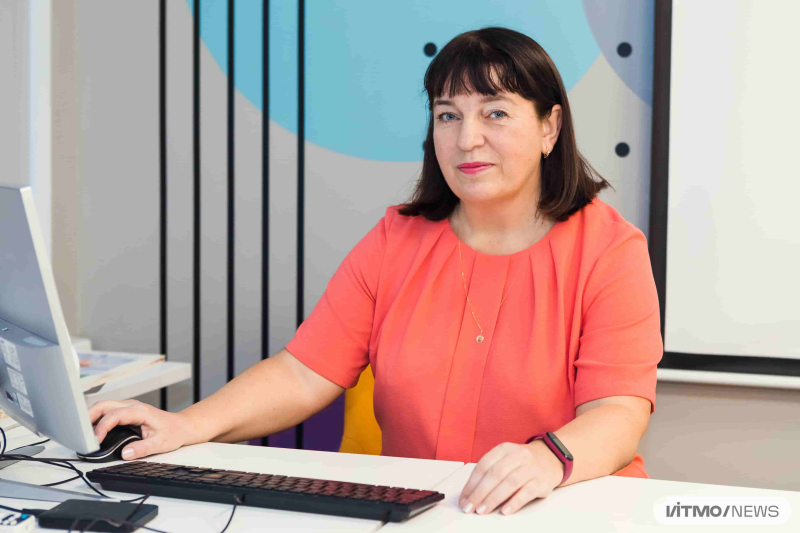
What is your favorite spot in St. Petersburg?
My favorite place for relaxing and reflecting are the beautiful parks, gardens, and fountains of Peterhof. I also love the Neva embankment with its magnificent bridges and architecture.
What is your dream travel destination and why?
I would like to visit Switzerland and admire the well-known local landscapes.
What is your favorite thing about the Russian language?
The soulfulness and melody. The Russian culture and Russian soul is reflected in the language.
What Russian language learning tips do you have?
You have to communicate with people as much as possible. Watching Russian films is excellent for Russian learners, first you can watch with Russian subtitles, then consider removing them. Interval repetition is considered an effective technique for memorizing words. The idea is to return to the words you are learning at constantly increasing intervals, from several days to several weeks.
How do you teach students to pronounce the sound Ы?
This is one of the most difficult letters in the Russian alphabet for foreigners. The first thing you need to do is to feel and work out the difference between the letters И and Ы. There is a special pencil trick that will give you good practice. Bite on a pencil with your teeth and try to pronounce the И sound. The pencil will not allow your tongue to rest against your teeth, and you will not be able to close your jaw, so the Ы sound will get better and better every time. Then try to pronounce it without the pencil. Also, don’t forget to try tongue twisters with this letter.
What tips would you give to future students to help them prepare for coming to Russia?
Make sure to get to know a bit about the Russian culture. Look online to see what sights there are to see in St. Petersburg, what the climate is like, how and where our students live, what opportunities they have for leisure and entertainment. Look at our university’s website.
You can meet more of ITMO’s staff in our Get to Know series – including our International Office staff, Biotechnelogy specialists, and Student Services Office team.
